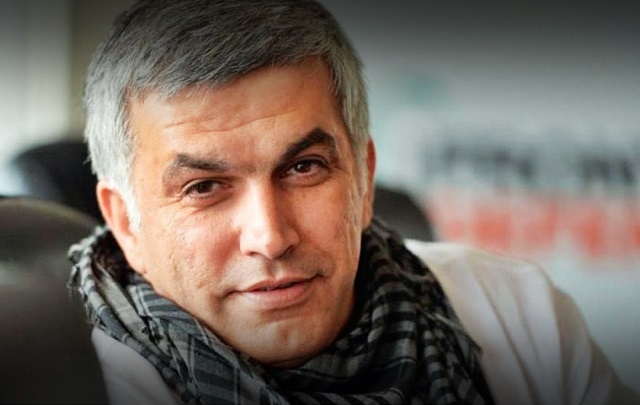16 January 2018 – Yesterday, the Bahraini Court of Cassation rejected human rights defender Nabeel Rajab’s appeal and confirmed his two-year prison sentence for discussing restrictions on free expression and the press in several television interviews. Yesterday also saw the latest hearing in a separate case against Rajab in which he faces prosecution over tweets and retweets. Rajab’s defense presented final arguments and the trial was then adjourned until 21 February 2018, when the court’s verdict is expected. If convicted, Rajab may be sentenced to up to an additional 15 years in prison. Americans for Democracy & Human Rights in Bahrain (ADHRB) condemns the continuing judicial harassment and clear acts of reprisal against Nabeel Rajab for his human rights work and peaceful criticism. We call on the Government of Bahrain to immediately release him and all other detainees held solely for exercising their right to free expression.
In July 2017, the High Criminal Court in Manama found Rajab guilty of “publishing and disseminating rumors and false news” in relation to TV interviews he gave in 2015 and 2016. He was sentenced to two years in prison. Rajab has repeatedly appealed, but the conviction and sentence have been confirmed each time. The 15 January decision of the Court of Cassation is final.
In a separate case, Rajab faces further charges of “spreading false rumors in time of war,” “insulting public authorities,” and “insulting a foreign country.” This is in relation to comments posted to his Twitter highlighting allegations of torture in Bahrain’s prisons and criticizing Bahrain’s role in the Saudi Arabia-led military operation in Yemen. The trial began on 12 July 2016 and has extended over 19 months of frequent rescheduling and postponement since his initial arrest. If Rajab is convicted in this case next month, he faces up to 15 additional years in prison.
During his time in prison, Rajab has been exposed to harsh treatment and inhumane living conditions. Shortly after arresting Rajab, the Government of Bahrain placed him in solitary confinement. Rajab reported that the cell in which he was detained was filthy and full of insects. As a result, Rajab’s health suffered a significant decline. The guards also subjected him to degrading treatment, including forcibly shaving his hair, arbitrarily raiding his cell at night, and confiscating his personal items.
Rajab has also been denied adequate medical care. During his time in detention, he has suffered from severe skin infections and chronic gallstones, among other ailments. The government has refused to provide treatment for his gallstones. Rajab was also diagnosed with an irregular heartbeat and a significant skin infection due to his solitary confinement in unsanitary conditions. These conditions required him to undergo emergency surgery, and to remain hospitalized for several months.
Nabeel Rajab is just one of thousands of Bahrainis targeted for exercising basic human rights like those to free expression or assembly. Bahrain is currently estimated to hold between 3,000 and 4,000 political prisoners, giving it the highest per capita incarceration rate in the Middle East. The repeated postponements of Rajab’s trials also reflects a government pattern of arbitrarily extending or interfering in the judicial procedures against activists as yet another form of reprisal.
The international community has voiced its concern over the government’s targeting of Nabeel Rajab and other civil society actors in Bahrain. Fifteen human rights organizations have sent letters to the United States, the United Kingdom, the European Union, and other governments asking them to support Rajab “by condemning his sentencing and calling for his immediate and unconditional release, and for all outstanding charges against him to be dropped.” Late last year, ADHRB attempted to deliver a petition calling for Rajab’s release and containing over 15,000 signatures to the Bahraini Embassy in Washington, DC. The US, among other states, has called for the release of Rajab and for the Government of Bahrain to abide by its international obligations and commitments to respect human rights and fundamental freedoms, including the freedom of expression.
“Bahrain’s highest court has affirmed a patently repressive ruling against Nabeel Rajab, clearly demonstrating the judicial system’s disregard for basic rights like free expression,” said Husain Abdulla, ADHRB’s executive director. “Meanwhile, Rajab’s trial for tweets has now stretched over a year and a half without any resolution, as the courts continue to extend a case that should never have begun in the first place. The government does not abide by rule of law in Bahrain, and so we look to the international community to hold the kingdom to its human rights commitments, and to press the authorities to drop all charges against Rajab and ensure his immediate and unconditional release from prison.”
ADHRB calls on Bahrain to uphold its international obligations to fair trial standards, to the minimum standard of treatment of prisoners, and to all international human rights mechanisms. We further call on the international community to insist on accountability for the widespread and systematic abuses continuing daily in Bahrain. Human rights defenders must be free to carry out their work, and Rajab is no exception. We call on the government to immediately and unconditionally drop all charges against Nabeel Rajab, and release him from detention.





